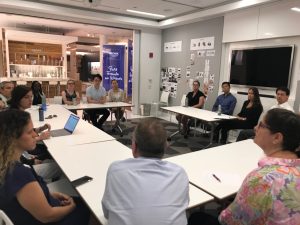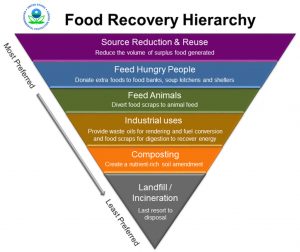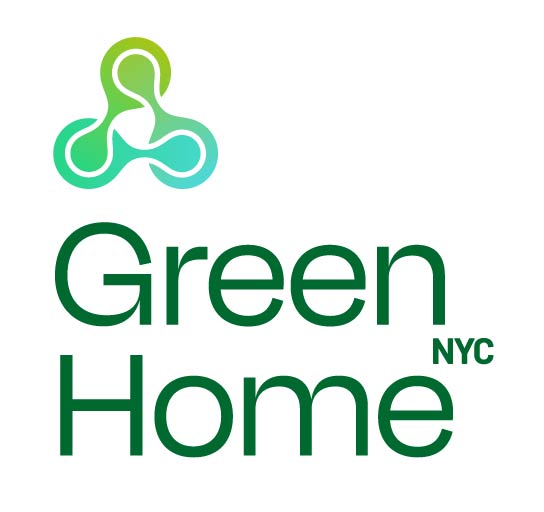By Tamanna Mohapatra
 Photo by Kenton Archer
Photo by Kenton Archer
On July 9th, 2019, GreenHomeNYC hosted a panel discussion on careers in waste management. Our three panelists engaged the audience with inspiring stories about their career paths, and offered insights into this growing and varied field. They also shared great career tips with the diverse group of participants.
Emily Gove is Head of Sustainability with BMS (Building Maintenance Service), a janitorial, security and architectural restoration company. BMS is a wholly owned subsidiary of Vornado Realty Trust and is responsible for managing 24 commercial buildings in Manhattan.
A North Carolina native, Emily has a background in Environmental Science and began her sustainability career at Steven Winter Associates, Inc. While there, she acquired her LEED AP credential. She recently switched tracks to the world of green cleaning, purchasing, and waste education for commercial buildings in New York City. In her current role, among other duties, Emily oversees waste audits, and works to educate tenants on better recycling and waste practices.
Through her position at BMS, Emily has learned a lot about how DSNY (NYC Department of Sanitation) helps buildings manage their waste—using both carrots and sticks. One stick is a fine of $100 for missing labeling on waste bins. Four types of bins are available for buildings: paper, metals/glass/plastic, compost, and pure trash. The first three are considered recyclable. Pure trash is more expensive to haul, so buildings have a clear incentive to recycle more through better waste management practices. In NYC, DSNY handles residential waste pickup, while private hauling companies are responsible for waste pickup from all other sources, including restaurants, commercial buildings, and bodegas.
Robert Lee is the Founder of Rescuing Leftover Cuisine, a national 501(c)3 non-profit food rescue organization, operating in 16 cities and headquartered in New York City. With a small core team and a large group of volunteers, the organization helps prevent food waste by partnering with restaurants to collect excess wholesome cuisine and deliver it to homeless shelters around the city.
An NYU graduate, Robert became interested in food waste as part of an NYU club that collected excess food from a few NYU cafeterias and donated it to a nearby shelter. While still at NYU, he was instrumental in expanding the club’s message throughout the NYU campus and making sure that good, safe and excess food from campus made its way to hungry New Yorkers. After winning a venture competition, Robert left his full time job at JPMorgan Chase, and has been running Rescuing Leftover Cuisine for almost 5 years. The organization now has 8 full time staff, and partners with over 150 restaurants in NYC, plus more than 16 restaurants in other satellite cities.
Robert shared some details about running such an organization, and about the opportunities in the food waste space. The bad news is that there is a lot of food waste. The good news is that a wide range of players are thriving in the field of food waste reduction, including City Harvest, which has a minimum pound requirement per pickup of 150 pounds and is mostly truck-based. On the other hand, Rescuing Leftover Cuisine is mostly volunteer-based and handles pickups that are no more than 150 pounds each.
Robert also shared the Food Recovery Hierarchy, an upside down food waste pyramid that demonstrates how food waste can be reduced at the source. His organization is aligned with this approach.
 Zero Waste Consultant Amy Marpman
Zero Waste Consultant Amy Marpman has been in the sustainability world since long before sustainability became a buzzword. A native of Seattle, she made her way to New York via California. In NYC, she joined Great Forest, a boutique green consulting company as a recycling consultant and got her first exposure to waste management there. Following that, she joined Recycletrack Systems, a startup that focuses on waste metrics and on helping clients manage their waste, as their Sustainability Director. From there she moved on to independent consulting, starting with work for municipalities in Florida. Amy now plans to lead the Queens Solid Waste Advisory Board, so watch out for more news on that front!
Regarding career advice, the panelists offered the following: Start by learning as much as possible, join various groups, and make introductions. For consulting work, your focus should be on helping clients save or make money. When applying for jobs, look for such entry level titles such as Sustainability Analyst and Project Associate. Don’t worry about getting pigeonholed. Just focus on gaining knowledge, then figure out if there’s something you want to get into more deeply. Most importantly don’t give up. Keep connecting the dots.
Here are some of the resources shared by panelists and audiences alike. Check them out:
We’d like to thank GROHE for hosting this event.
*********************************************************************************
Want to learn more about recycling? Join us at our next Forums event on August 21. Recycling Today: How It Works and What You Can Do to Improve It. Meet two of our best urban recycling leaders so you can become a better leader of the NYC and world recycling community.
Register Here
 Photo by Kenton Archer
On July 9th, 2019, GreenHomeNYC hosted a panel discussion on careers in waste management. Our three panelists engaged the audience with inspiring stories about their career paths, and offered insights into this growing and varied field. They also shared great career tips with the diverse group of participants.
Emily Gove is Head of Sustainability with BMS (Building Maintenance Service), a janitorial, security and architectural restoration company. BMS is a wholly owned subsidiary of Vornado Realty Trust and is responsible for managing 24 commercial buildings in Manhattan.
A North Carolina native, Emily has a background in Environmental Science and began her sustainability career at Steven Winter Associates, Inc. While there, she acquired her LEED AP credential. She recently switched tracks to the world of green cleaning, purchasing, and waste education for commercial buildings in New York City. In her current role, among other duties, Emily oversees waste audits, and works to educate tenants on better recycling and waste practices.
Through her position at BMS, Emily has learned a lot about how DSNY (NYC Department of Sanitation) helps buildings manage their waste—using both carrots and sticks. One stick is a fine of $100 for missing labeling on waste bins. Four types of bins are available for buildings: paper, metals/glass/plastic, compost, and pure trash. The first three are considered recyclable. Pure trash is more expensive to haul, so buildings have a clear incentive to recycle more through better waste management practices. In NYC, DSNY handles residential waste pickup, while private hauling companies are responsible for waste pickup from all other sources, including restaurants, commercial buildings, and bodegas.
Robert Lee is the Founder of Rescuing Leftover Cuisine, a national 501(c)3 non-profit food rescue organization, operating in 16 cities and headquartered in New York City. With a small core team and a large group of volunteers, the organization helps prevent food waste by partnering with restaurants to collect excess wholesome cuisine and deliver it to homeless shelters around the city.
An NYU graduate, Robert became interested in food waste as part of an NYU club that collected excess food from a few NYU cafeterias and donated it to a nearby shelter. While still at NYU, he was instrumental in expanding the club’s message throughout the NYU campus and making sure that good, safe and excess food from campus made its way to hungry New Yorkers. After winning a venture competition, Robert left his full time job at JPMorgan Chase, and has been running Rescuing Leftover Cuisine for almost 5 years. The organization now has 8 full time staff, and partners with over 150 restaurants in NYC, plus more than 16 restaurants in other satellite cities.
Robert shared some details about running such an organization, and about the opportunities in the food waste space. The bad news is that there is a lot of food waste. The good news is that a wide range of players are thriving in the field of food waste reduction, including City Harvest, which has a minimum pound requirement per pickup of 150 pounds and is mostly truck-based. On the other hand, Rescuing Leftover Cuisine is mostly volunteer-based and handles pickups that are no more than 150 pounds each.
Robert also shared the Food Recovery Hierarchy, an upside down food waste pyramid that demonstrates how food waste can be reduced at the source. His organization is aligned with this approach.
Photo by Kenton Archer
On July 9th, 2019, GreenHomeNYC hosted a panel discussion on careers in waste management. Our three panelists engaged the audience with inspiring stories about their career paths, and offered insights into this growing and varied field. They also shared great career tips with the diverse group of participants.
Emily Gove is Head of Sustainability with BMS (Building Maintenance Service), a janitorial, security and architectural restoration company. BMS is a wholly owned subsidiary of Vornado Realty Trust and is responsible for managing 24 commercial buildings in Manhattan.
A North Carolina native, Emily has a background in Environmental Science and began her sustainability career at Steven Winter Associates, Inc. While there, she acquired her LEED AP credential. She recently switched tracks to the world of green cleaning, purchasing, and waste education for commercial buildings in New York City. In her current role, among other duties, Emily oversees waste audits, and works to educate tenants on better recycling and waste practices.
Through her position at BMS, Emily has learned a lot about how DSNY (NYC Department of Sanitation) helps buildings manage their waste—using both carrots and sticks. One stick is a fine of $100 for missing labeling on waste bins. Four types of bins are available for buildings: paper, metals/glass/plastic, compost, and pure trash. The first three are considered recyclable. Pure trash is more expensive to haul, so buildings have a clear incentive to recycle more through better waste management practices. In NYC, DSNY handles residential waste pickup, while private hauling companies are responsible for waste pickup from all other sources, including restaurants, commercial buildings, and bodegas.
Robert Lee is the Founder of Rescuing Leftover Cuisine, a national 501(c)3 non-profit food rescue organization, operating in 16 cities and headquartered in New York City. With a small core team and a large group of volunteers, the organization helps prevent food waste by partnering with restaurants to collect excess wholesome cuisine and deliver it to homeless shelters around the city.
An NYU graduate, Robert became interested in food waste as part of an NYU club that collected excess food from a few NYU cafeterias and donated it to a nearby shelter. While still at NYU, he was instrumental in expanding the club’s message throughout the NYU campus and making sure that good, safe and excess food from campus made its way to hungry New Yorkers. After winning a venture competition, Robert left his full time job at JPMorgan Chase, and has been running Rescuing Leftover Cuisine for almost 5 years. The organization now has 8 full time staff, and partners with over 150 restaurants in NYC, plus more than 16 restaurants in other satellite cities.
Robert shared some details about running such an organization, and about the opportunities in the food waste space. The bad news is that there is a lot of food waste. The good news is that a wide range of players are thriving in the field of food waste reduction, including City Harvest, which has a minimum pound requirement per pickup of 150 pounds and is mostly truck-based. On the other hand, Rescuing Leftover Cuisine is mostly volunteer-based and handles pickups that are no more than 150 pounds each.
Robert also shared the Food Recovery Hierarchy, an upside down food waste pyramid that demonstrates how food waste can be reduced at the source. His organization is aligned with this approach.
 Zero Waste Consultant Amy Marpman has been in the sustainability world since long before sustainability became a buzzword. A native of Seattle, she made her way to New York via California. In NYC, she joined Great Forest, a boutique green consulting company as a recycling consultant and got her first exposure to waste management there. Following that, she joined Recycletrack Systems, a startup that focuses on waste metrics and on helping clients manage their waste, as their Sustainability Director. From there she moved on to independent consulting, starting with work for municipalities in Florida. Amy now plans to lead the Queens Solid Waste Advisory Board, so watch out for more news on that front!
Regarding career advice, the panelists offered the following: Start by learning as much as possible, join various groups, and make introductions. For consulting work, your focus should be on helping clients save or make money. When applying for jobs, look for such entry level titles such as Sustainability Analyst and Project Associate. Don’t worry about getting pigeonholed. Just focus on gaining knowledge, then figure out if there’s something you want to get into more deeply. Most importantly don’t give up. Keep connecting the dots.
Here are some of the resources shared by panelists and audiences alike. Check them out:
Zero Waste Consultant Amy Marpman has been in the sustainability world since long before sustainability became a buzzword. A native of Seattle, she made her way to New York via California. In NYC, she joined Great Forest, a boutique green consulting company as a recycling consultant and got her first exposure to waste management there. Following that, she joined Recycletrack Systems, a startup that focuses on waste metrics and on helping clients manage their waste, as their Sustainability Director. From there she moved on to independent consulting, starting with work for municipalities in Florida. Amy now plans to lead the Queens Solid Waste Advisory Board, so watch out for more news on that front!
Regarding career advice, the panelists offered the following: Start by learning as much as possible, join various groups, and make introductions. For consulting work, your focus should be on helping clients save or make money. When applying for jobs, look for such entry level titles such as Sustainability Analyst and Project Associate. Don’t worry about getting pigeonholed. Just focus on gaining knowledge, then figure out if there’s something you want to get into more deeply. Most importantly don’t give up. Keep connecting the dots.
Here are some of the resources shared by panelists and audiences alike. Check them out:
